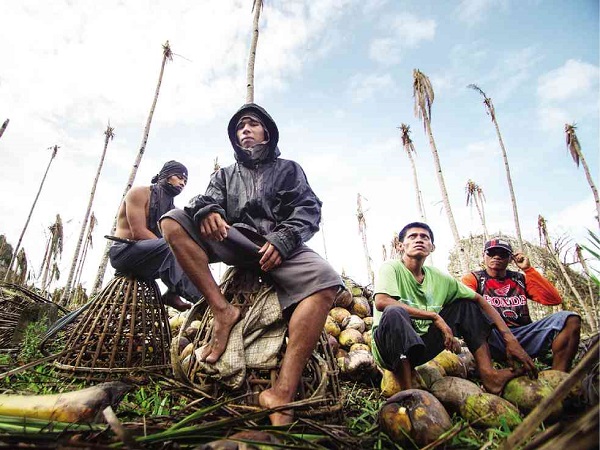$4M to bring farms back to life seen from group

COCONUT pickers rest on piles of salvaged coconuts in a typhoon-devastated farm in Marabut town, Western Samar. The amount of destruction wrought by Supertyphoon “Yolanda” on farms and sources of livelihood in the Visayas has yet to unravel. RICHARD BALONGLONG/INQUIRER NORTHERN LUZON
BAGUIO CITY—The International Fund for Agricultural Development (Ifad) has earmarked $4 million to buy seeds and restart farming in areas hit by Supertyphoon “Yolanda” last month, particularly in Eastern and Western Visayas.
Yolando Arban, Ifad country officer, said the agency intended to replenish agricultural materials for 59,000 hectares of farmland.
“We will conduct very strict monitoring of how the fund will be spent—from the procurement to the delivery of the seeds,” Arban said on Wednesday, in light of pork barrel anomalies that involved agricultural materials and supplies.
“We will ensure that the seeds and agriculture materials reach the beneficiaries,” he added.
The money will be turned over to the Department of Agriculture, which has recently been cited in anomalous projects, too.
Article continues after this advertisementArban said the seeds and other farming materials from the Ifad money would be sent to local governments so these could be distributed to farmers in ravaged towns and provinces.
Article continues after this advertisementThe Department of Finance had written Ifad about tapping the grant in rehabilitation efforts.
“The fund [for the Yolanda survivors] is already there [and is being processed]. It has to be approved by the [Ifad] board but I do not think the board will deny assistance to the victims,” Arban said.
Ifad also wants a detailed briefing about the government’s rehabilitation plan, he said, adding that it also hopes to start distributing farming implements to beneficiaries by January.
“We have to speed up the process because we want farmers to catch up with their planting season from December and March. The sooner they get back on their feet, the better,” he said.
The storm (international name: “Haiyan”) struck the country on Nov. 8, killing more than 5,600 people. The death toll is still rising, as more bodies are turning up.
The government said it would need to raise at least P41 billion to restore the communities wiped out by the storm. Kimberlie Quitasol, Inquirer Northern Luzon